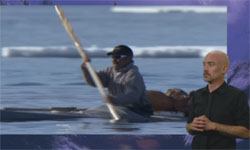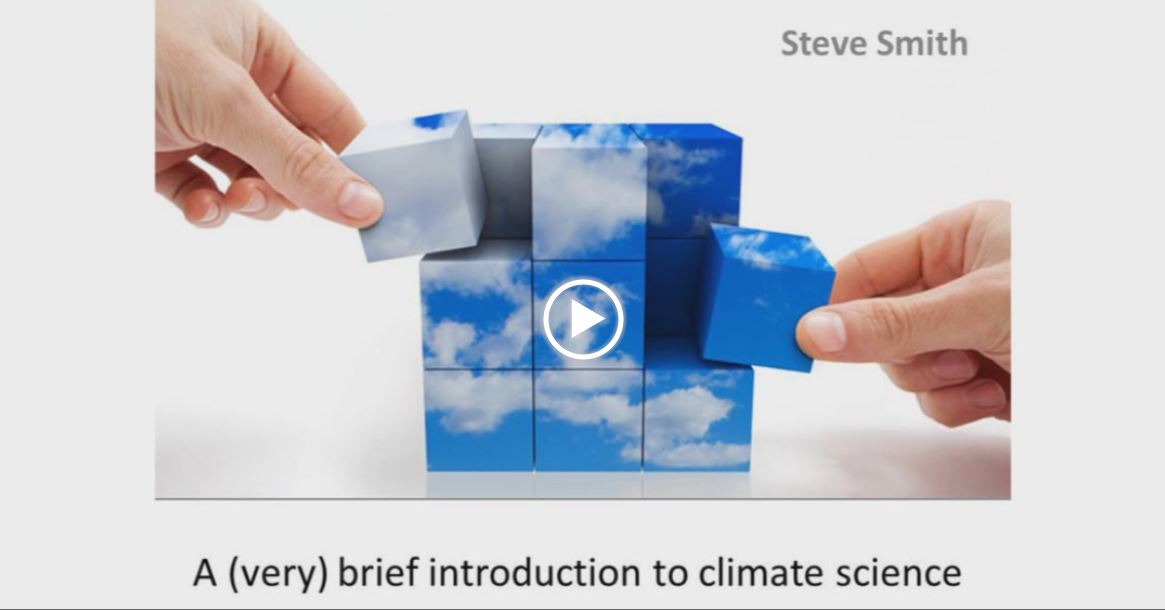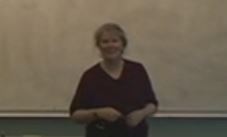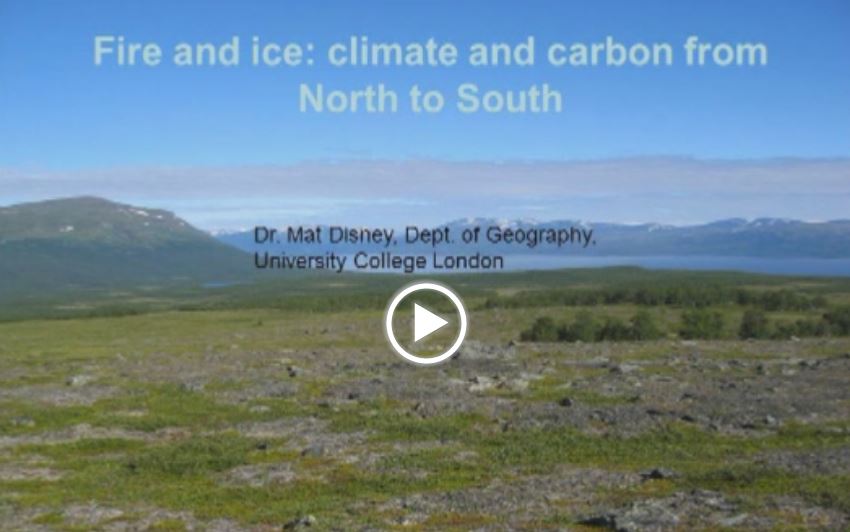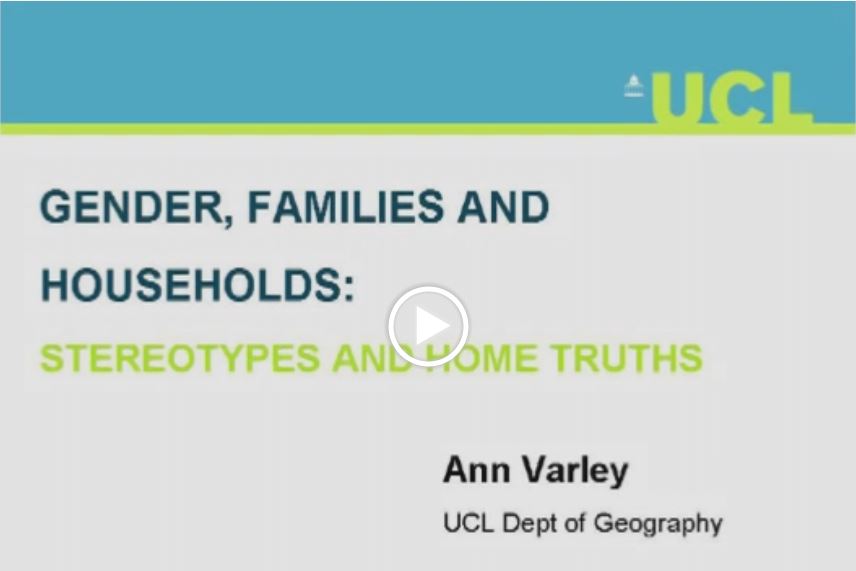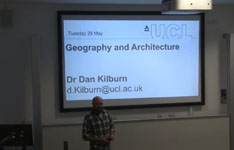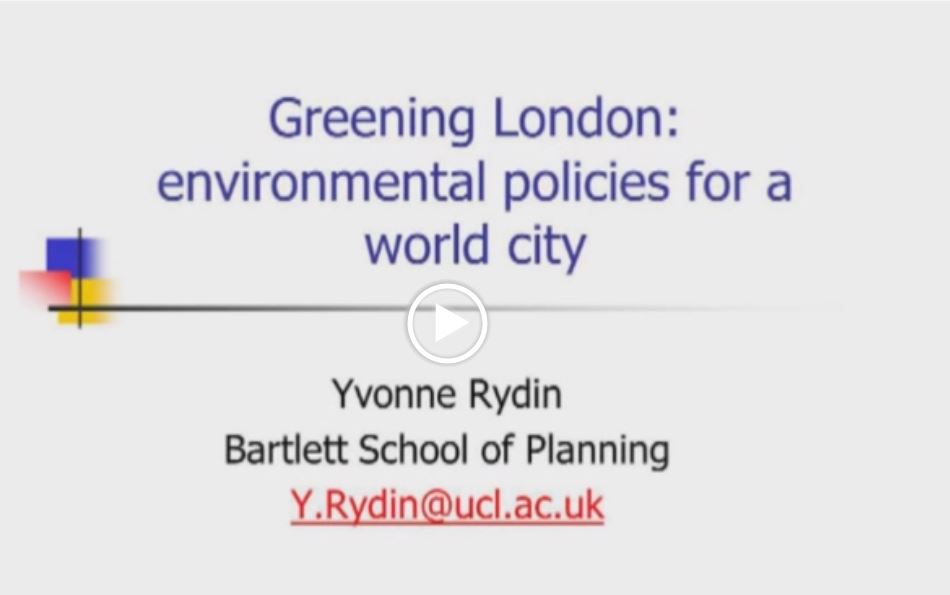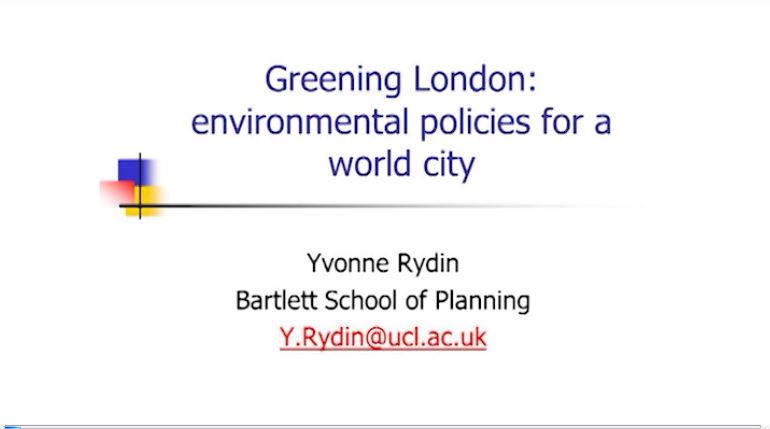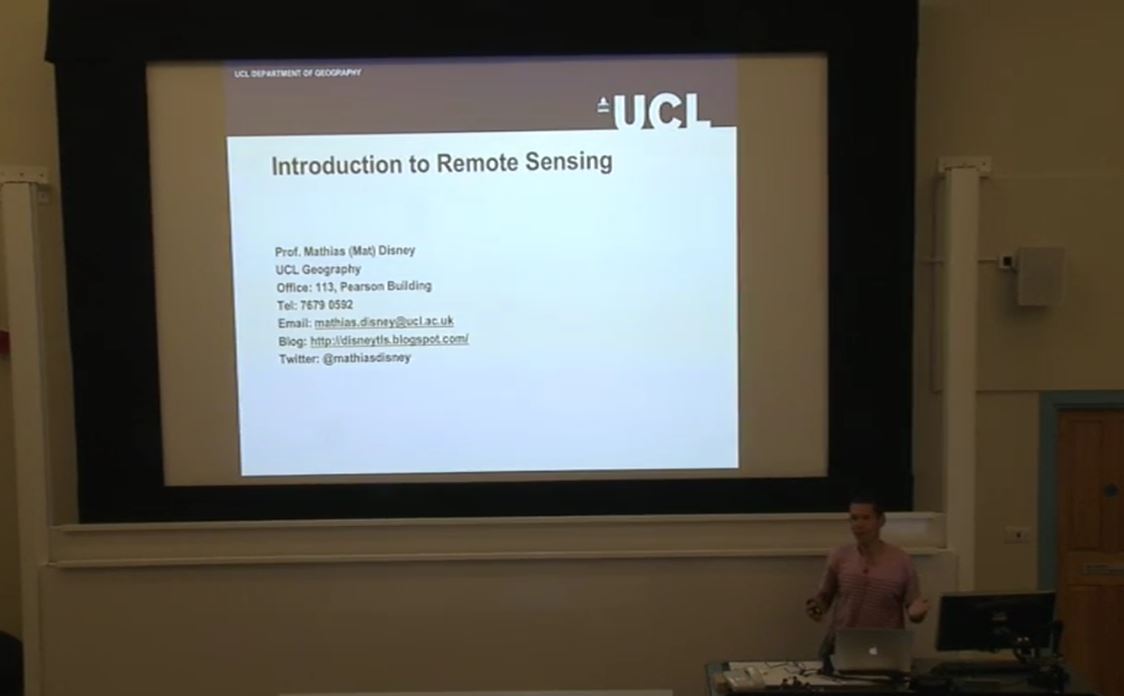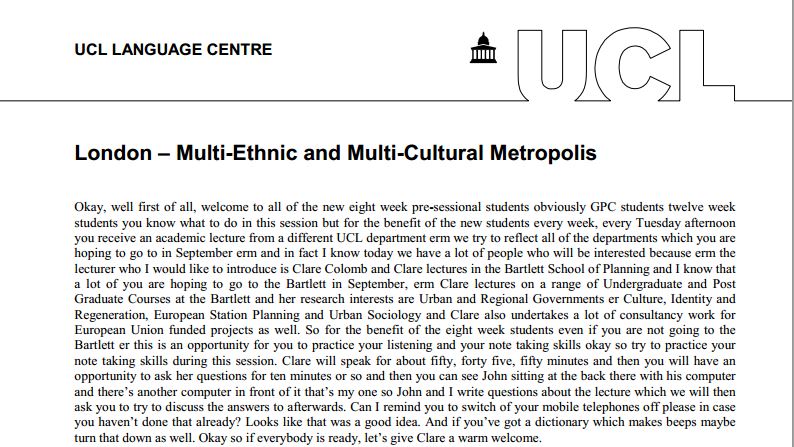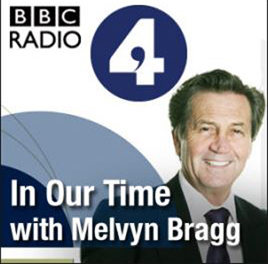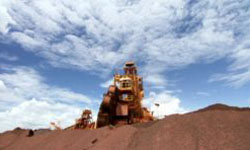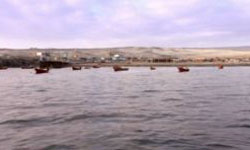Select one or more of these popular tags:
The Arctic is the harshest environment on Earth: little food grows, it's dark for months on end, and temperatures stay well below freezing for much of the year. Yet four million people manage to survive here.
- British-Sign-Language
- British-Sign-Language
- Natural World
- BSL subtitles
- 60
The Arctic is the harshest environment on Earth: little food grows, it's dark for months on end, and temperatures stay well below freezing for much of the year. Yet four million people manage to survive here.
-
Fire and Ice: Climate and Carbon from North to South
-
Dr Mat Disney , 2012
Diploma Lecture 2012
- Lectures
- General Science
- Lectures
- No subtitles
- 44
Diploma Lecture 2012
-
Geography and Architecture
-
Dr Dan Kilburn , 2018
Pre-Sessional Lecture 29.05.2018
- Lectures
- No subtitles
- 60
Pre-Sessional Lecture 29.05.2018
-
Greening London - Environmental Policies for a World City 2011
-
Prof Yvonne Rydin , 2011
GPC Pre-Sessional Lecture 2011
GPC Pre-Sessional Lecture 2011
-
Greening London: Environmental Policies for a World City. 2012
-
Prof. Yvonne Rydin , 2012
Diploma Lecture 2012
Diploma Lecture 2012
-
Introduction to Remote Sensing
-
Prof. Mathias Disney , 2018
Pre-sessional Lecture 17.07.2018
- Lectures
- No subtitles
- 46
Pre-sessional Lecture 17.07.2018
-
Introduction to Remote Sensing of Environmental Change (with transcript)
-
Dr Mathias Disney , 2007
Diploma November 2007
- Lectures
- General Science
- Geography
- Lectures
- No subtitles
- 60
Diploma November 2007
-
Natural Disasters - Acts of God? (with Worksheet)
-
Dr Anne Varley
TO BE REMOVED ?
- Lectures
- Geography
- Lectures
- Natural World
- No subtitles
- 50
TO BE REMOVED ?
-
Arctic Meltdown
-
Richard Hollingham
In 1996 US entrepreneur and explorer Gary Comer took his boat to the Northwest Passage in search of adventure. Inspired by the stories of early explorers like Roald Amundsen, who had tried to navigate the winding route through northern Canadian sea ice, Comer expected high adventure. Instead he found where there had once been ice, there was now easily navigated open water.
In 1996 US entrepreneur and explorer Gary Comer took his boat to the Northwest Passage in search of adventure. Inspired by the stories of early explorers like Roald Amundsen, who had tried to navigate the winding route through northern Canadian sea ice, Comer expected high adventure. Instead he found where there had once been ice, there was now easily navigated open water.
-
Book of the Week - Adrift in Caledonia
-
Nick Thorpe
Nick Thorpe takes the reader on boat-hopping odyssey through Scotland's canals, lochs and coastal waters, from the industrial Clyde to the scattered islands of Viking Shetland. Whether rowing a coracle with a chapter of monks, scanning for the elusive Nessie, hitting the rocks with Captain Calamity or clinging to the rigging of a tall ship, Thorpe weaves a narrative that is by turns funny and poignant - a nautical pilgrimage for any who have ever been tempted to try a new path just to see where it might take them. Part travelogue, part memoir, Adrift in Caledonia is a unique portrait of a sea-fringed nation
Nick Thorpe takes the reader on boat-hopping odyssey through Scotland's canals, lochs and coastal waters, from the industrial Clyde to the scattered islands of Viking Shetland. Whether rowing a coracle with a chapter of monks, scanning for the elusive Nessie, hitting the rocks with Captain Calamity or clinging to the rigging of a tall ship, Thorpe weaves a narrative that is by turns funny and poignant - a nautical pilgrimage for any who have ever been tempted to try a new path just to see where it might take them. Part travelogue, part memoir, Adrift in Caledonia is a unique portrait of a sea-fringed nation
-
Book of the Week - Lost Cosmonaut
-
Daniel Kalder
"Lost Cosmonaut" documents Daniel Kalder's travels in the bizarre and mysterious worlds of Russia's ethnic republics. Obsessed with a quest he never fully understands, Kalder boldly goes where no man has gone before: in the deserts of Kalmykia, he stumbles upon a city dedicated to chess and a forgotten tribe of Mongols; in Mari El, home to Europe's last pagan nation, he meets the Chief Druid and participates in an ancient rite; while in the bleak industrial badlands of Udmurtia, Kalder looks for Mikhail Kalashnikov, inventor of the AK-47, and accidentally becomes a TV star. Profane yet wise, utterly honest and yet full of lies, "Lost Cosmonaut" is an eye-opening, blackly comic tour of the most alien planet in our cosmos: Earth.
"Lost Cosmonaut" documents Daniel Kalder's travels in the bizarre and mysterious worlds of Russia's ethnic republics. Obsessed with a quest he never fully understands, Kalder boldly goes where no man has gone before: in the deserts of Kalmykia, he stumbles upon a city dedicated to chess and a forgotten tribe of Mongols; in Mari El, home to Europe's last pagan nation, he meets the Chief Druid and participates in an ancient rite; while in the bleak industrial badlands of Udmurtia, Kalder looks for Mikhail Kalashnikov, inventor of the AK-47, and accidentally becomes a TV star. Profane yet wise, utterly honest and yet full of lies, "Lost Cosmonaut" is an eye-opening, blackly comic tour of the most alien planet in our cosmos: Earth.
-
Book of the Week - Preferred Lies
-
Andrew Greig
Andrew Greig grew up on the East coast of Scotland, where playing golf is as natural as breathing. He sees the game as the great leveller, and has played on the Old course at St Andrews as well as on the miners' courses of Yorkshire. He writes about the different cultural manifestations of the game, the history, the geography, the different social meanings, as well as the subjective experience, the reflections between shots. An indispensable book for golfers and non golfers alike.
Andrew Greig grew up on the East coast of Scotland, where playing golf is as natural as breathing. He sees the game as the great leveller, and has played on the Old course at St Andrews as well as on the miners' courses of Yorkshire. He writes about the different cultural manifestations of the game, the history, the geography, the different social meanings, as well as the subjective experience, the reflections between shots. An indispensable book for golfers and non golfers alike.
-
Book of the Week - Wildwood: A Journey Through Trees
-
Roger Deakin
From the walnut tree at his Suffolk home, Roger Deakin embarks upon a quest that takes him through Britain, across Europe, to Central Asia and Australia, in search of what lies behind man's profound and enduring connection with wood and with trees. Meeting woodlanders of all kinds, he lives in shacks and cabins, builds hazel benders, and hunts bush-plums with aboriginal women. At once autobiography, history, a traveller's tale and a work of natural history, "Wildwood" is a lyrical and fiercely intimate evocation of the spirit of trees: in nature, in our souls, in our culture, and in our lives.
From the walnut tree at his Suffolk home, Roger Deakin embarks upon a quest that takes him through Britain, across Europe, to Central Asia and Australia, in search of what lies behind man's profound and enduring connection with wood and with trees. Meeting woodlanders of all kinds, he lives in shacks and cabins, builds hazel benders, and hunts bush-plums with aboriginal women. At once autobiography, history, a traveller's tale and a work of natural history, "Wildwood" is a lyrical and fiercely intimate evocation of the spirit of trees: in nature, in our souls, in our culture, and in our lives.
-
Cosmic Ocean 1
-
Leo Enright
Programme 1: Water - a unique molecule. Our planet is dominated by water: it covers nearly three quarters of the Earth’s surface, is fundamental to plate tectonics, carves the landscape through erosion and is necessary for all life on Earth – and therefore all life as we know it.
Programme 1: Water - a unique molecule. Our planet is dominated by water: it covers nearly three quarters of the Earth’s surface, is fundamental to plate tectonics, carves the landscape through erosion and is necessary for all life on Earth – and therefore all life as we know it.
-
Cosmic Ocean 2
-
Leo Enright
Programme 2: Water elsewhere. NASA’s mission statement is to “follow the water”. The recent dramatic results from the small armada of probes on Mars suggest this approach is now paying off. It appears the planet was bathed in a watery past. But the surface is now dry and barren. Scientists are now using experiments on board both European and American probes to work out where all of the planet’s water has gone.
Programme 2: Water elsewhere. NASA’s mission statement is to “follow the water”. The recent dramatic results from the small armada of probes on Mars suggest this approach is now paying off. It appears the planet was bathed in a watery past. But the surface is now dry and barren. Scientists are now using experiments on board both European and American probes to work out where all of the planet’s water has gone.
-
Great Lives - Captain James Cook
-
Greg Dyke
James Cook is one of Britain's foremost explorers. His three voyages to the Pacific added greatly to the fields of navigation, anthropology and biology. His aim was to go, "farther than any man has been before me, but as far as I think it possible for a man to go".
James Cook is one of Britain's foremost explorers. His three voyages to the Pacific added greatly to the fields of navigation, anthropology and biology. His aim was to go, "farther than any man has been before me, but as far as I think it possible for a man to go".
-
In Our Time - Oceanography
-
Melvyn Bragg
With Margaret Deacon, visiting Research Fellow at Southampton Oceanography Centre and author of Scientists and the Sea, Tony Rice, Biological Oceanographer and author of Deep Ocean, Simon Schaffer, Reader in History and Philosophy of Science at the University of Cambridge, and a fellow of Darwin College.
With Margaret Deacon, visiting Research Fellow at Southampton Oceanography Centre and author of Scientists and the Sea, Tony Rice, Biological Oceanographer and author of Deep Ocean, Simon Schaffer, Reader in History and Philosophy of Science at the University of Cambridge, and a fellow of Darwin College.
-
Planet Earth Under Threat
-
Gabrielle Walker
The final part of the series exploring how climate change is affecting the natural world.
The final part of the series exploring how climate change is affecting the natural world.
-
AA - Illustrated Guide to Britain
-
Various , Drive Publications Ltd , 1973
Explores the history and culture of Britain
- No Barcode 1274
- Special Interest
- Geography
- 1 copies
- C1 C2
Explores the history and culture of Britain
-
Britain - The Country and its People: An Introduction for Learners of English
-
James O'Driscoll , Oxford University Press , 1995
This book is aimed at intermediate and advanced learners of English who want to know more about Britain and the British
- 0-194-32429-X 1942
- Special Interest
- Geography
- 2 copies
- B2 C1 C2
This book is aimed at intermediate and advanced learners of English who want to know more about Britain and the British
-
Britain in Close-Up: Second Edition
-
David McDowall , Pearson , 1999
This book is an in-depth study of the public and private faces of contemporary Britain, and thoroughly examines the changes and challenges the nation faces as it enters the 21st century
- 0-582-32826-8 1945
- Special Interest
- Geography
- 2 copies
- B1 B2 C1
This book is an in-depth study of the public and private faces of contemporary Britain, and thoroughly examines the changes and challenges the nation faces as it enters the 21st century
-
Korea - People, Country and Culture
-
Keith Howard, Susan Pares & Tessa English , SOAS , 1996
From centuries of relative obscurity, Korea is rapidly becoming a major economic force in the world. This book is intended to act as a useful resource bank of information, including sections on geography, history, religion, art and economics
- 0728602660 1276
- Special Interest
- Geography
- Special Interest
- 1 copies
- B2 C1 C2
From centuries of relative obscurity, Korea is rapidly becoming a major economic force in the world. This book is intended to act as a useful resource bank of information, including sections on geography, history, religion, art and economics
-
Pocket Road Atlas of Great Britain
-
, Heron Books , 1981
- B00BAOPOQ0 4498
- Special Interest
- Geography
- 1 copies
- A1 A2 B1 B2 C1 C2
Jonathan Dimbleby travels through Brazil, the continent\'s largest country.
- TV-Recordings
- Geography
- No subtitles
- 60
Jonathan Dimbleby travels through Brazil, the continent\'s largest country.
Dimbleby discovers how Chile has transformed since the demise of General Pinochet.
- TV-Recordings
- Geography
- No subtitles
- 60
Dimbleby discovers how Chile has transformed since the demise of General Pinochet.

